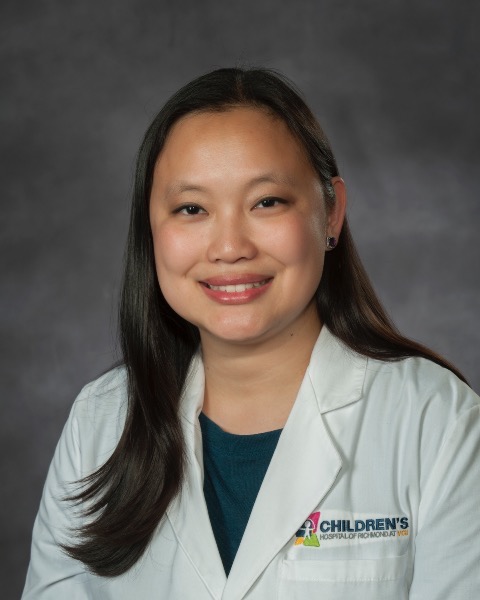Medical Education: Fellow
Category: Abstract Submission
Medical Education 3 - Medical Education: Fellow I
583 - How Fellows Grow-Up: Evaluating Autonomy Development of Pediatric Subspecialty Fellows
Friday, April 22, 2022
6:15 PM - 8:45 PM US MT
Poster Number: 583
Publication Number: 583.117
Publication Number: 583.117
Ashlie Tseng, Children's Hospital of Richmond at VCU, VCU SOM, Richmond, VA, United States; Kimberly O'Hara, University of Colorado School of Medicine/Children’s Hospital Colorado, Denver, CO, United States; Janice L. Hanson, Washington University in St. Louis School of Medicine, St. Louis, MO, United States; Deborah DiazGranados, Virginia Commonwealth University School of Medicine, Richmond, VA, United States; Jennifer Maniscalco, Johns Hopkins All Children's Hospital, St. Petersburg, FL, United States; Michael S. Ryan, Children’s Hospital of Richmond at VCU, Richmond, VA, United States

Ashlie Tseng, MD, Med
Associate Professor of Pediatrics
Children's Hospital of Richmond at VCU, VCU Health
Richmond, Virginia, United States
Presenting Author(s)
Background: Fellowship programs have the dual responsibility of preparing physicians for independent practice while providing appropriate supervision to ensure safe patient care. Prior research has shown that fellows report their autonomy may be limited by programmatic requirements for supervision. The method by which fellows develop autonomy in the course of their training has not been studied.
Objective: To explore the perspectives of pediatric subspecialty fellows about their autonomy development during training.
Design/Methods: Using the epistemological framework of social constructivism, we performed a qualitative study to investigate the perspective of fellows from all pediatric subspecialty fields at four university-based institutions across the United States. We conducted semi-structured interviews to explore fellow perspectives regarding their experience with autonomy development. Using a phenomenological approach, we inductively and iteratively identified codes and organized them into themes after sequential group discussions until consensus and thematic sufficiency were achieved.
Results: We interviewed 26 pediatric subspecialty fellows. Data analysis yielded three themes: individual factors/actions of fellows and attendings, team structure and dynamics, and academic learning environment. Fellow actions included asking for help. Attending actions included positioning during rounds, using both direct and indirect supervision, and encouraging fellows’ decision-making. Team considerations included being respected and seen, acting as a leader, trust and communication among team members, and collaborating with advanced practice providers (APPs). The learning environment included attributes associated with the training program (e.g., taking transport call) and patient care issues such as acuity.Conclusion(s): We identified individual, team, and academic learning environment factors perceived to influence autonomy development of pediatric subspecialty fellows. Fellows may be a unique population of learners due to the dynamics of their team structure and interaction with APPs. Fellows expressed a need to be “respected and seen” to support their autonomy development. Strategies to enhance autonomy development include allowing fellows flexibility for decision-making when possible, structuring call schedules to allow patient care decisions, setting clear expectations around communication, and providing time to build relationships of trust. Such actions may promote fellows’ autonomy and readiness for independent practice.
TABLE 1: Themes and subthemes with representative codes.jpg)
TABLE 2: Themes and subthemes with demonstrative quotes.jpg)
Objective: To explore the perspectives of pediatric subspecialty fellows about their autonomy development during training.
Design/Methods: Using the epistemological framework of social constructivism, we performed a qualitative study to investigate the perspective of fellows from all pediatric subspecialty fields at four university-based institutions across the United States. We conducted semi-structured interviews to explore fellow perspectives regarding their experience with autonomy development. Using a phenomenological approach, we inductively and iteratively identified codes and organized them into themes after sequential group discussions until consensus and thematic sufficiency were achieved.
Results: We interviewed 26 pediatric subspecialty fellows. Data analysis yielded three themes: individual factors/actions of fellows and attendings, team structure and dynamics, and academic learning environment. Fellow actions included asking for help. Attending actions included positioning during rounds, using both direct and indirect supervision, and encouraging fellows’ decision-making. Team considerations included being respected and seen, acting as a leader, trust and communication among team members, and collaborating with advanced practice providers (APPs). The learning environment included attributes associated with the training program (e.g., taking transport call) and patient care issues such as acuity.Conclusion(s): We identified individual, team, and academic learning environment factors perceived to influence autonomy development of pediatric subspecialty fellows. Fellows may be a unique population of learners due to the dynamics of their team structure and interaction with APPs. Fellows expressed a need to be “respected and seen” to support their autonomy development. Strategies to enhance autonomy development include allowing fellows flexibility for decision-making when possible, structuring call schedules to allow patient care decisions, setting clear expectations around communication, and providing time to build relationships of trust. Such actions may promote fellows’ autonomy and readiness for independent practice.
TABLE 1: Themes and subthemes with representative codes
.jpg)
TABLE 2: Themes and subthemes with demonstrative quotes
.jpg)
